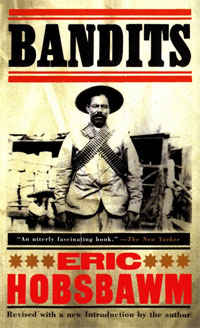ERIC HOBSBAWM (1917- )
Eric Hobsbawm emigrated to England from Berlin in 1933, when he was a schoolboy. He observed in his autobiography, Interesting Times (2002), that "It was impossible to remain outside politics . . . the months in Berlin made me a lifelong communist." Hobsbawm joined the Communist Party in 1936, and his lifelong support of Marxism (he let his membership in the party lapse not long before its dissolution in 1991), together with his generalist approach to history in a field noted for specialization, have both been reasons for a highly controversial and influential career as Britain’s best-known and most-enduring Marxist historian.
His innovative social history on bandits, revolutionaries, and workers inspired a "Hobsbawm generation" of researchers in the 1960s and 1970s. His trilogy charting the rise of capitalism, The Age of Revolution (1962), The Age of Capital (1975), and The Age of Empire (1987), became a defining work of his chosen period, the "long nineteenth century," from 1789 to 1914. Thinking and writing on a grand scale but also highly accessible, Hobsbawm has been credited with having a hand in the current popularity of the field of history.
The Age of Extremes (1994), which was translated into thirty-seven languages, extended Hobsbawm's range into the "short twentieth century," which is almost spanned by his own life, from World War I to the collapse of the Soviet Union in 1991. Hobsbawm, writing under the pseudonym Francis Newton, was the New Statesman's jazz critic for a decade. His proudest moments were receiving an honorary degree beside Benny Goodman and meeting the gospel singer Mahalia Jackson. He disparaged modernism in high art, when the "real revolution," he suggested, lay elsewhere, such as in the cinema.
Peripatetic as a displaced child and then as an academic, Hobsbawm speaks German, French, Spanish, and Italian fluently and reads Dutch, Portuguese, and Catalan. With his reputation even greater abroad, official recognition came slowly in Britain, where he was made a Companion of Honour in 1998. Hobsbawm insists that "whatever I've achieved has been with minimum, or no, concessions."
Hobsbawm has had a politically charged career as an academic. He was a member of the British Communist party historians' group from 1946 through 1956, and in 1952 he co-founded the influential journal Past and Present, whose contributors included many non-Marxists. They pioneered social history from the "bottom up." Hobsbawm wrote variously about culture, from Romantic music to the role of the flat cap and fish and chips in working-class consciousness. Unlike fellow British Marxist historians, he took an international approach, writing about Sicilian bandits and Chicago gangsters. In the 1960s he was visiting professor at Stanford, then MIT, having to apply each time for exceptions to the U.S. ban on granting visas to communists.
In the 1970s, Hobsbawm espoused Italian Eurocommunism, which distanced itself from Moscow (he found its shining star, Gramsci, "marvellously stimulating"). He also played a controversial role in the emergence of New Labour in Britain, pointing to the inadequacy of Old Labour in the face of social and economic changes. However, Hobsbawm has since criticized New Labour for going "much too far in accepting the logic of the free market" and in turn has been disparaged as an out-of-touch "special intellectual" of Labour. Hobsbawm says, "While I share people's disappointment in Blair, it's better to have a Labour government than not."
